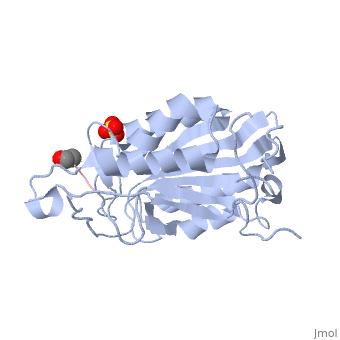Maureen E. Hill/Sandbox1
From Proteopedia
Caspase-7 Dynamics
Caspases are a family of CBI Molecules being studied in the University of Massachusetts Amherst Chemistry-Biology Interface Program at UMass Amherst and on display at the Molecular Playground.
Caspase-7 as studied in the Hardy Lab
Conformational dynamics in Caspase-7 are mediated by an 'Allosteric Toggle' mechanism in which binding of allosteric inhibitor DICA to CYS 290 pushes TYR 223 into 'up' conformation forcing ARG 187 'out' into a form that is physically incompatible with substrate binding. The cleaved termini of the large and small subunits which form the active site loop bundle become highly ordered in active conformation, and highly disordered in allosterically inhibited form (so much so that they cannot be resolved crystallographically). BackgroundCaspases are cysteine-aspartate proteases that are responsible for the execution of apoptosis, also known as programmed cell death. Dysregulation of apoptosis has been linked to neurodegenerative disorders, including Alzheimer's and Huntington's, as well as inflammatory diseases and cancer. The apoptotic caspases consist of two distinct classes: the initiators (caspase -2, -8, -9, and -10) and the executioners (caspase -3, -6, and -7). All caspases are synthesized as catalytically inactive zymogens that must undergo proteolytic cleavage to be activated during apoptosis. Initiator caspases are activated by upstream cellular events, which in turn cleave at distinct internal aspartate residues in the executioner caspases to remove the prodomain and separate the large and small subunits. The executioner caspases then cleave a wide range of targets within the cell that ultimately leads to cellular suicide. Caspase-7 StructureCaspases are crystallized as homodimers. Each monomer contains a large (~20 kDa) and a small (~10 kDa) subunit. The active site is made up of four flexible loops which include L2, L3 and L4 from one half of the dimer that interact with L2' from the opposite half of the dimer. In the , the loops are disordered, which prevents substrate binding. Upon cleavage at the intersubunit linker, the active-site loop bundle becomes partially ordered, whereas L2' stays in the inactive, down conformation. At this point, caspase-7 may bind either substrate or allosteric inhibitors. Substrate binding forces L2' to move upward, creating a foundation beneath the L2 bundle. However, if caspase-7 were to bind an allosteric inhibitor at the dimer-interface cavity, the L2' loop would be locked in the down conformation, thereby inactivating the enzyme.
Forms of Caspase-7
Molecular Playground banner for Caspase-7Molecular Playground banner: Conformational Dynamics between active and allosterically inhibited caspase-7 elucidate the mechanism of allostery in this important class of cysteine proteases. 3D structures of caspaseAdditional ResourcesFor additional information, see: Cancer
| ||||||||||||||||||

